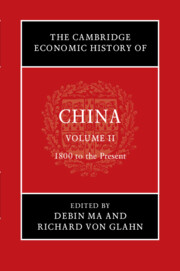Book contents
- The Cambridge Economic History of China
- The Cambridge Economic History of China
- The Cambridge Economic History of China
- Copyright page
- Contents
- Figures
- Maps
- Tables
- Contributors to Volume II
- Acknowledgments
- Note on Citations
- Introduction to Volume II
- Part I 1800–1950
- 1 Ideology and the Contours of Economic Change
- 2 Economic Transition in the Nineteenth Century
- 3 Agriculture
- 4 Handicraft and Modern Industries
- 5 The State and Enterprises in Late Qing China
- 6 State Enterprises during the First Half of the Twentieth Century
- 7 Money and the Macro-economy
- 8 Public Finance
- 9 Financial Institutions and Financial Markets
- 10 Chinese Business Organization
- 11 The Economic Impact of the West
- 12 Foreign Trade and Investment
- 13 Transport and Communication Infrastructure
- 14 Education and Human Capital
- Part II 1950 to the Present
- Index
- References
5 - The State and Enterprises in Late Qing China
from Part I - 1800–1950
Published online by Cambridge University Press: 07 February 2022
- The Cambridge Economic History of China
- The Cambridge Economic History of China
- The Cambridge Economic History of China
- Copyright page
- Contents
- Figures
- Maps
- Tables
- Contributors to Volume II
- Acknowledgments
- Note on Citations
- Introduction to Volume II
- Part I 1800–1950
- 1 Ideology and the Contours of Economic Change
- 2 Economic Transition in the Nineteenth Century
- 3 Agriculture
- 4 Handicraft and Modern Industries
- 5 The State and Enterprises in Late Qing China
- 6 State Enterprises during the First Half of the Twentieth Century
- 7 Money and the Macro-economy
- 8 Public Finance
- 9 Financial Institutions and Financial Markets
- 10 Chinese Business Organization
- 11 The Economic Impact of the West
- 12 Foreign Trade and Investment
- 13 Transport and Communication Infrastructure
- 14 Education and Human Capital
- Part II 1950 to the Present
- Index
- References
Summary
This chapter focuses on the so-called Self-Strengthening era during the second half of the nineteenth century when the Qing empire was expanding state involvement in industry and technology from its traditional ideology. The origin and motivation of state involvement in the private market during this era is different from that in the early twentieth century, which began to take lessons from Meiji Japan and the ideology of modernization (see Bian’s chapter in this volume). There were some elements of continuity here – in remnants of “Self-Strengthening” through the state efforts both to build up modern enterprises and develop to science and technology. This chapter explains the impact of the state sector’s emergence that was manifested in the development and expansion of state arsenals and modern enterprises.
Keywords
- Type
- Chapter
- Information
- The Cambridge Economic History of China , pp. 167 - 183Publisher: Cambridge University PressPrint publication year: 2022



